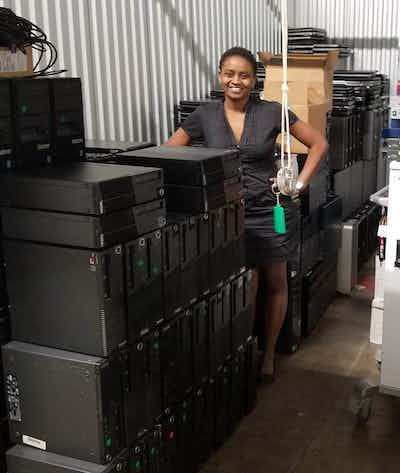
Want to Empower Africa? Donate Technology

The surge in the fourth industrial revolution has echoed the relevance of technology in driving economies.
Technology is the route to uniting the world, leveling education, commerce, and fighting poverty. Most importantly, playing a role in putting Africa in the development equation is the best gift we can give it.
This article focuses on technological milestones, challenges Africa faces while attempting to succeed technologically, and why we should rethink donation as the path to Africa’s success. Read on to find out more.
Tech Milestones
Computers have come a long way to impact our daily lives. The major milestones are the ENIAC of 1946, IBM’s PC (1981), the birth of the world wide web in 1989, and the genesis of a connected world in 2000.
After that, Moore’s law, which implies computing power doubles per two years, has been influential.
Fast forward, we are now discussing Artificial intelligence, the Internet of Things, 5G, nanotechnology, robotics, 3D printing, and solar photovoltaic.
And here is the more exciting part.
You may wonder, “How does technology grow?” A chunk of the magical technological advancements has been through donation.
How Does Donating Technology Impact Growth?
The advanced technological world we enjoy living in today has grown fast through open-source. Open-source is a type of donation where software developers dedicate their time and expertise to write and freely give their code to be used in productive activities.
NPM (node package manager) alone has more than 1 billion free packages to help developers. The junior and intermediate developers can then have an easy time writing code for the good of society.
Many developers benefit from YouTube tutorials, free programming books, and charity organizations.
These developers end up creating programs that ease e-commerce, remote working, e-learning, and community connection by building social media, commercial, and educational apps.
The sad thing is that despite the free resources, Africa lags technologically. Why?
Let me tell you a short story.
Nelly Cheboi, like many African kids from a humble background, struggled to survive. She scavenged garbage pits for food. She shed tears seeing her family drowning in an abyss of poverty.
Through hard work, she met well-wishers who sponsored her tech studies at Augustana College, IL, in 2012. She is now a software engineer. After seeing the light, she is reflecting it to Africa through TechLit Africa.
TechLit Africa empowers Africans by donating laptops to children of humble backgrounds. You can contribute to the mission here. The enlightened Africans can tackle trending gigs such as digital marketing, software development, and content writing.
Like many African tech evangelists, she has realized two main challenges dragging Africa’s technological growth.
What's Hard about Tech in Africa?
We Start too Late
First, most Africans dive into technology when they are above 20. In most technologically advanced continents, children grow with technology.
For example, Bill Gates was a software developer at 13. Kids aged 9 to 13 are likely to grasp new technology faster because they are more creative. Besides, they have better concentration power because they face less pressure from family obligations.
To propel technological growth, Nelly introduces kids to programming as early as she can. This reduces the kids’ learning curves.
The Background Demoralizes
Many African children possess the urge to study software development, but they lack the means to utilize free online resources. Think about Elon Musk.
Although he was born in Africa, he sold one of his games at $500 when he was 13 — like most kids from developed continents do.
Technology transformed his life at a tender age because he had early exposure to computers. He is now transforming other lives through his products and motivation.
Conclusion
Nelly Cheboi’s story is a typical example of an African software developer’s journey. We struggle to find learning resources. Well-wishers hold our hands, putting a smile on our faces, and we find life worth living.
In the end, we can spread Africa’s digitalization through giving.
Now that we understand the challenges dragging Africa’s technological growth and how we can help, it is our turn to donate technology.
About The Author

Tyler Cinnamon is a American programmer and entrepreneur. He started TechLit Africa with Nelly Cheboi in 2018 to disrupt poverty with used IT devices.